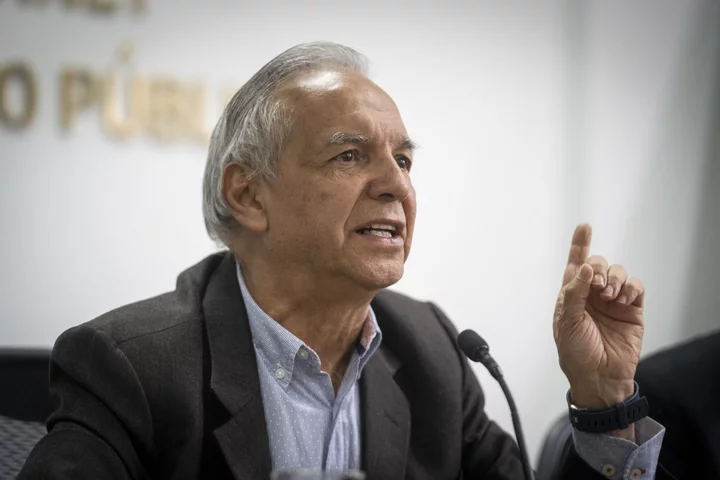Colombian policymakers may start to discuss interest rate cuts in the second half of the year if inflation continues to cool down, according to Finance Minister Ricardo Bonilla.
Inflation slowed in April, but a single month of good price data isn’t enough to make the case for monetary easing, Bonilla said Tuesday during an interview at the Finance Ministry in Bogota.
“If we start to see a trend of lower general inflation, core inflation, and inflation for low-income families, we can certainly talk to the central bank, firstly with a view to holding rates, and then to look at when would be the right time to start easing,” he said.
Inflation cooled from a 24-year high last month, and policymakers expect it will continue to slow toward the 3% target. The central bank raised its policy rate to 13.25% last month, the highest level since 1999, though most economists predict it will now halt its monetary tightening campaign.
The deceleration that the economy is experiencing is part of a global slowdown, and calls for a policy of economic activation, said Bonilla, who’s a voting member of the central bank’s board.
Asked whether he would carry out President Gustavo Petro’s ideas on how to curb price increases, Bonilla said he was hired to tell him the truth, “not to flatter him.” Petro has repeatedly criticized the central bank’s interest rate increases, instead proposing measures such as fertilizer subsidies to rein in inflation.
“He wants to know what the real situation in the country is,” Bonilla said.
Gasoline Prices
Bonilla said that state-controlled oil company Ecopetrol SA can’t be expected to subsidize fuel prices.
Gasoline subsidies caused a massive deficit after former President Ivan Duque, Petro’s predecessor, didn’t increase fuel prices in the aftermath of the pandemic. The decision left the current administration with a “real problem,” Bonilla said, since it leaves less money available for social spending.
The government will start to analyze next month the best path to increase diesel subsidies which have a more significant impact on food prices and transportation costs, but that doesn’t necessarily mean diesel prices will start to rise in June, he said.
More Borrowing
Lower-than-estimated oil prices will force the government to raise its 2023 fiscal deficit target to about 4% of gross domestic product from the current 3.8%, the minister said. The government had estimated average Brent crude prices of $94 per barrel in 2023, far above the $82 per barrel the commodity averaged so far this year.
In order to finance that additional deficit, the government will have to seek more borrowing, preferably in the local bond market, and investors would be willing to buy that additional debt.
“We have not had any difficulties with debt sale so far. International investors continue to believe in Colombia,” Bonilla said.
Despite the wider deficit for this year, the government is committed to continue narrowing the fiscal imbalance, he added.
Public Pension Fund
The government-proposed pension reform includes the creation of a savings fund, which Bonilla says should serve to seek higher returns for workers and retirees.
“What must be examined is where the resources are best invested and how we can guarantee savers that they are building a pension fund,” Bonilla added.
The existing norms for private pension funds that set the investment limits in assets, including bonds, shares, and private capital, are good enough to regulate the new government fund. “The regulation is valid because you have several alternatives,” he said.
Bonilla took office last week after Petro unexpectedly ousted Jose Antonio Ocampo from the Finance Ministry.
(Adds Bonilla’s comments from 3rd paragraph.)

